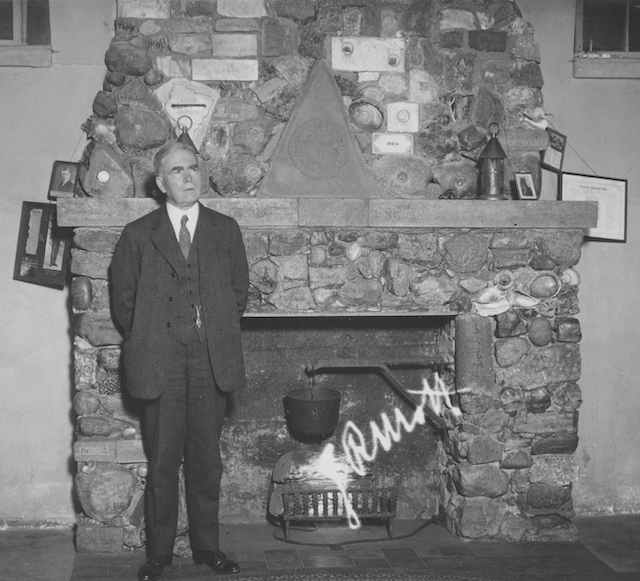
At age 81, John R. Mott was awarded the Nobel Peace Prize in 1946 after he “…created worldwide organizations which have united millions of young people in work for the Christian ideals of peace and tolerance between nations…” Photo courtesy of Upper Iowa University
July/Aug 2023 (Volume 15, Issue 4)
By Tim Harwood
It was a brilliant day on Oct. 3, 2022, in northeast Iowa, more late summer than early autumn. Fall colors were emerging, but the last hearty produce in Postville’s backyard gardens was still being gathered. College students in Fayette attended lectures and talked about happenings in the wider world. It was a day John Mott might have appreciated, reminiscent of his own youth and adolescence in those two communities approximately 150 years earlier.
That day was a special commemoration of Mott’s world-influencing achievements, although only a small minority in Iowa’s northeastern-most counties knew of the occasion or even the man himself for whom Postville Community School District’s John R. Mott High School is named. For the first time, the Episcopal Church venerated Mott with a feast day.
“What we celebrate in the lives of the saints is the presence of Christ expressing itself in and through particular lives lived in the midst of specific historical circumstances,” explained the denomination in its “Lesser Feasts and Fasts” instructional.
For Mott, the historical circumstances were a late 19th and early 20th century world where barriers to travel and communication were crumbling. Visionary ideas of all stripes — unattainable before steam power and telecommunication — seemed viable. Mott’s vision was “The Evangelization of the World in this Generation,” the title of his 1900 book. He circled the globe several times on that mission, bringing together Christian communities on each trip and bridging divisions and schisms which had sometimes lasted centuries. At age 81, he was awarded the 1946 Nobel Peace Prize.
It is fitting that Mott’s saintly virtues were recognized by the Episcopal Church; Mott was a Methodist. It’s a related but distinctly different branch of Protestant Christianity. The harmonization of such seemingly discordant facts is consistently part of Mott’s story. He was not born in Iowa, but Iowa was where early experiences cast the man. He held impressive titles for many international organizations, but none of them substitute as a cliched shorthand for understanding his life’s work. He was not formally a minister, but he spent his adult life trying to observe the New Testament’s Great Commission: “Go into all the world and preach the gospel to all creation.”
John Raleigh Mott was born in Livingston Manor, N.Y., on May 25, 1865, but his family relocated to Postville in September 1865. Mott’s father, John, operated a successful lumber business and became Postville’s first mayor. His mother, Elmira, coordinated the family’s religious and social life. Young Mott’s work experience began in the family garden. He was promoted to an informal part-time job in the lumberyard while he attended primary school. Industriousness with a touch of lingering pioneer spirit — the area was only a couple of generations removed from being a frontier wilderness — were strong early traits.
“I have long thought that it was life on those boundless plains which profoundly kindled my imagination and was a great factor in making me responsive in later years to worldwide visions and plans,” Mott wrote later.
When Mott was in his teens, Horace Warner was Postville’s young Methodist minister. Warner had been a student at Upper Iowa University, inspiring Mott to attend the college in Fayette. He enrolled in 1881 at just 16. Mott was on campus for four years where he studied history and was an award-winning student debater. He found a niche in the school’s Philomathean Literary Society. He represented that organization during formal, yet lively, campus debates. Mott was also a charter member of Upper Iowa’s Young Men’s Christian Association when it was founded in 1885, serving on the group’s initial Bible Study Committee.
With his 20th birthday approaching, the young scholar was indecisive about what career to pursue. As the family’s only son, he could have returned to Postville to manage the lumber operation. His rhetorical skills, coupled with a youthful idealism, made a future in law and then politics attractive. Mott also considered the ministry. Ultimately, he deferred the decision. Weighing several prominent universities at which to extend his studies, Mott chose Cornell University in Ithaca, N.Y.
“My life work must reveal itself to me before long,” he wrote in a letter home. “I have long had a feeling within me that I was meant for something more than a business life; it has been my ever present ambition to do something for the world. In what sphere that work is to be done, is not yet clear to me.”
TO READ THE ENTIRE STORY AND OTHER FASCINATING STORIES ABOUT IOWA HISTORY, subscribe to Iowa History Journal.
